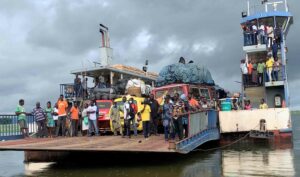African States urged to mainstream mitigation, adaptation strategies into national development plans
 African States have been urged to mainstream climate change mitigation and adaptation strategies into their national development plans to address climate-induced migration within and across the continent.
African States have been urged to mainstream climate change mitigation and adaptation strategies into their national development plans to address climate-induced migration within and across the continent.
“National stakeholders in Africa should address the leadership and governance deficits on the continent by promoting democracy, the rule of law and accountable government.
“These are vital for preventing or addressing the situations that force people to migrate,” a communique issued at the end of the 3rd Kofi Annan Peace and Security (KAPS) Forum organised by the Kofi Annan International Peacekeeping Training Centre (KAIPTC), said.
The communiqué, co-signed by Major General Richard Addo Gyane, the Commandant of the KAIPTC and Dr Mahamed Ibn Chambas, Chairman, Kofi Annan Peace and Security Forum (KAPS Forum), is based on deliberations and conclusions at the KAPS Forum relating to migration, climate change and demography.
Mr Chambers said among others, the Forum discussed the push and pull factors which triggered migration, adding that most of the migration that occurred in Africa was intra-African movement.
He said contrary to some international media reports that only developed countries bore the brunt of the wave of movement, other African countries were affected by migration within the continent.
Dr Chambers, also the Chair of the AU High-Level Panel on Sudan, said the biggest humanitarian crisis in the world currently is in Africa, Sudan, where some 10 million Sudanese were internally displaced with two million migrants dotted in neighbouring African countries.
In that context, he said, there was the need for some support for the African countries that were taking in all the migrants.
He said as a result of climate change, many environments were becoming uninhabitable, pushing populations out of areas they used to be.
Dr Chambers, who is also the African Union High Representative for Silencing the Guns, said the situation had often triggered a number of conflicts particularly in West Africa and the Sahel Region where nomadic communities were leaving the sahel and moving further south triggering farmer-herder conflicts.
The communiqué, therefore, urged African states to leverage the climate security and migration-related protocols they are party to, by identifying and removing the barriers to their implementation.
It said, “National and regional stakeholders should prioritise African independence in the articulation, ownership, funding and implementation of policies related to climate security, migration and peacebuilding.”
Also, the KAPS Forum recommended that international cooperation should be strengthened to address the lopsided impact of climate change on African states, which have been least responsible for greenhouse gas emissions.
“States in Sub-Saharan Africa, and their counterparts in the Maghreb, Middle East, Europe and North America, should strengthen multilateral cooperation to protect the rights of refugees and other migrants in their countries,” the communiqué said.
The KAPS Forum further recommended that African states should provide broader opportunities for the youth and centre youth participation in governance processes.
“Given that women bear the brunt of climate insecurities, their needs and priorities should be integrated into mitigation and adaptation measures,” the communiqué said.
It, therefore, called for the mainstreaming of women’s leadership in governance in local, national and regional policies and programmes as well as their implementation.
The third in a series, Dr Chambers, the Chair of the Forum, assured that the Centre was determined to work closely with the Presidency of Ghana to incorporate the Forum as a programme of the presidency in honour of Ghana’s illustrious son and global icon, Kofi Annan.
Major General Richard Addo Gyane, Commandant, KAIPTC, commended Dr Chambers, the Chair of the KAPS Forum, for his commitment to ensuring peace and security on the African continent.
“You have been a pillar to the Centre and we appreciate how you guided the forum with maturity to a successful end,” he said.
The Commandant said the Centre was committed to working assiduously with partners to institutionalise the biannual Forum.
Source: GNA
